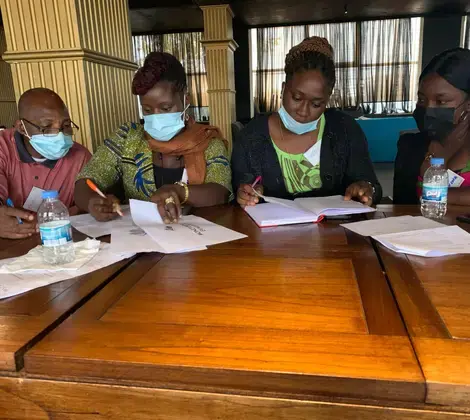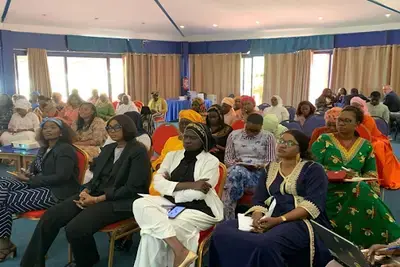
Success Story
Partners in Policy: Boosting Liberian CSOs Cooperation with Legislators on Tackling Health Issues
Addressing gaps in public health services in rural parts of Liberia requires teamwork. Goldy Kontoe Freeman and her colleagues at Community Health Care Initiative (CHI), a civil society organization (CSO) based in Bong County, Liberia, have already done extensive research on the causes of maternal mortality in rural Liberia, where overreliance on traditional maternal health practices and ongoing infrastructural challenges prevent many women from receiving necessary care. “When we take a look at midwives, because of traditional practices, they are stuck delivering at home,” Freeman says. A report by CHI furthermore highlights how poor road infrastructure, among a variety of other factors, limits accessibility to health facilities. Without support from the national legislature, however, challenges in addressing infrastructural gaps and in integrating new health practices will persist.

For Veronica Gluashea, 29, of Youth in Technology and Arts Network (YOTAN-Partner for Social Accountability), one of the most valuable parts of the workshop was the in-depth look at how a bill becomes a law in Liberia. “I didn’t know how the legislative system worked. Being in this program has opened my mind,” she said, “to what the legislature is doing in the House [of Representatives].” Gayflor Worzi, Gluashea’s colleague at YOTAN, was struck by the strategic approaches to advocacy that participants discussed during the workshop. In particular, he learned about the importance of narrowing your focus on policy solutions that address concrete, specific issues. “Everybody wants to eat the elephant, but where do we take the first bite?” he said, quoting a metaphor that longtime NDI trainer David Hunter presented when teaching about advocacy strategy.
The workshop also provided valuable networking opportunities for participants. “In this country, there are so many advocacy institutions,” Worzi said. “You find out that many of them are doing the same things… I want to build coalitions. For instance, you can have a coalition based on building local institutions with the same strategy and same goal.” Throughout the workshop, both during seminars and during the breaks, participants formed bonds and partnerships to cooperate on tackling challenges. Before the end of the workshop, the participants formed a WhatsApp group so that they can regularly update each other on their organizations’ events and advocacy initiatives and to identify opportunities to collaborate in the future.
Moving forward, NDI will continue to support each organization that participated in the workshop to hone their legislative advocacy plans and will connect CSOs with legislators who can work with them on their cause. “We tried to contact three legislators who buy the idea that women need primary healthcare,” Freeman said during the workshop, noting that CHI has had trouble getting such legislators to respond to them. NDI will work with CSOs on reaching out to elected officials at strategic moments, such as when relevant bills are entering the committee phase in the legislative process, so that officials are more likely to engage with them. NDI will also invite relevant organizations to participate in public policy roundtables with legislators so that they can amplify citizen voices in shaping policy. NDI plans on livestreaming these roundtables through Facebook and other platforms so that a broader swath of the Liberian public can get involved in the discussion.
Through these engagements, NDI seeks to help CSOs partner with the legislature to translate advocacy into action for those who need it most. As Gluashea says, “advocacy is going out there and appealing to the government for those that do not have the voice to stand out.”
NDI is a non-profit, non-partisan, non-governmental organization that works in partnership around the world to strengthen and safeguard democratic institutions, processes, norms and values to secure a better quality of life for all. NDI envisions a world where democracy and freedom prevail, with dignity for all.



